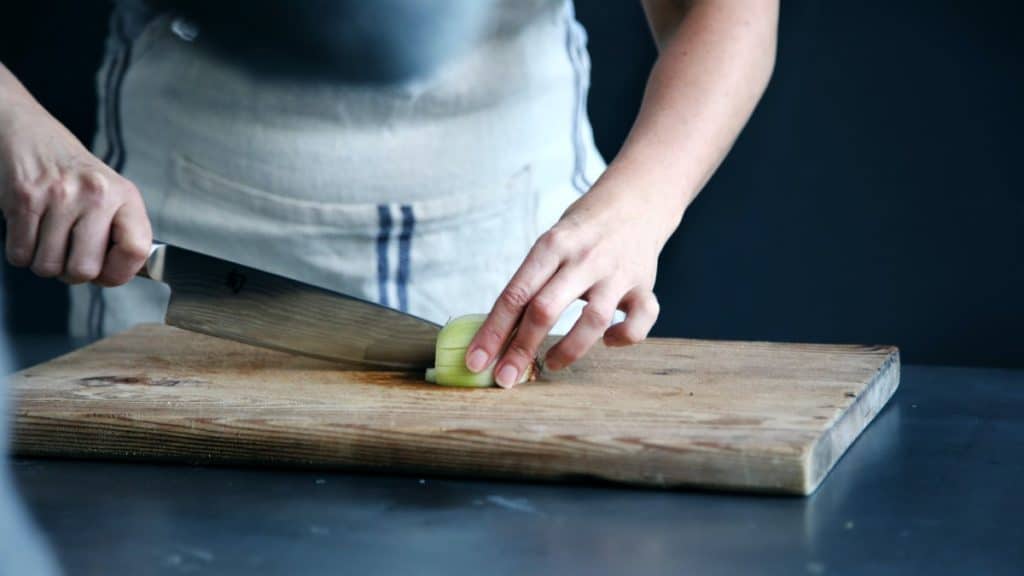My route to becoming a chef was not the most traditional way. However, As you will learn from this article, there are many different options on how to become a chef.
Fear not though, although becoming a chef can seem confusing, we are going to break it down into easily digestible chunks so you can pick the best way to begin a chef career

To become a chef, I completed a culinary apprenticeship, working full time in a kitchen whilst studying in my spare time. However, there is an option to study at college full time and gain part time kitchen experience. We will look at the pros and cons to both options.
To become a chef in the UK a person needs to achieve an NVQ level 2 in professional cookery and have relevant experience. However, some employers are willing to overlook the qualification if a chef has enough relevant experience
in professional cookery and have relevant experience. However, some employers are willing to overlook the qualification if a chef has enough relevant experience
If you can demonstrate that you have previous experience as a chef (perhaps in another country) then it may be possible to secure a chef job, without an NVQ qualification.
This is the concise answer about the basics required to become a chef. However, I will break down the various options below, and provide help as to how to go about getting that all important experience!
Do Chefs Need To Be Qualified?
To become a chef in the UK, it is not essential to have a qualification, those with relevant work experience are likely to be able to get a job. However, in my experience it is very beneficial to have an culinary qualification if you hope to climb the career ladder
This is a great reason as to why being a chef is a truly universal trade A chef can take their experience anywhere in the world without worrying if their qualification is accepted in that country.
without worrying if their qualification is accepted in that country.
That being said, a professional cookery qualification is desirable, particularly for those starting out in the industry.
There are two main routes open to achieving an Cookery NVQ Qualification;
- The first is to go to college full time. A college will teach the theoretical and practical skills in their on site catering facilities. They usually have a restaurant which customers can pay a small amount to eat in, and are cooked for by the students. This is a gentle introduction for the students and allows them to experience cooking for customers without the pressure found in professional kitchens. This can be a great way for those who are less confident to build up their skills in a controlled environment.
- The second route is to take an apprentice chef position
 . This allows the student to work full time, whilst being paid, and also complete the theory side of the training in their own time at home. The student will be visited on site by an NVQ assessor who monitors their progress and checks on their general welfare. This can be a great route for those who want to experience kitchen life
. This allows the student to work full time, whilst being paid, and also complete the theory side of the training in their own time at home. The student will be visited on site by an NVQ assessor who monitors their progress and checks on their general welfare. This can be a great route for those who want to experience kitchen life as soon as possible and ‘jump into the deep end!’ The downside of this route is that it can be a huge learning curve particularly for younger people, going straight from school to a kitchen environment can be a big eye opener.
as soon as possible and ‘jump into the deep end!’ The downside of this route is that it can be a huge learning curve particularly for younger people, going straight from school to a kitchen environment can be a big eye opener.
Become A Chef Tip 1:
Apprentice Chef Positions come under different names depending on the employer’s personal preference. Search for jobs titled: Apprentice Chef, Trainee Chef, Trainee Commis, or Commis Chef . All mean a similar thing so it’s worth reading the job description to see which type of person they are looking for.
. All mean a similar thing so it’s worth reading the job description to see which type of person they are looking for.
Those that wish to do so, can continue their education by achieving a level 3 NVQ and above. This is up to personal preference, but my advice would be that a minimum of a level 2 is desirable.
Should I Do A Chef Apprenticeship, Or Go To Culinary School Full Time?
Some readers may be trying to decided if they should complete their cooking qualification full time in college or go down the Apprenticeship route.
These comparison tables below are designed to provide the pros and cons to each option;
| Full Time College Chef Course – Pros | Full Time College Chef Course – Cons |
|---|---|
| Get to meet lots of similar people with the same goals | Unrealistically slow paced service times |
| A gentle introduction to the world of catering. | Don’t get to experience pressure |
| Lots of dedicated instruction from teachers | Unrealistic number of chefs to diners |
| Time to learn all the techniques needed | Less working hours than an actual chef job |
| Will have some experience when entering a real kitchen | Low ratio of teachers to students |
| No angry head chefs if things go wrong | Unpaid |
These are the main pros and cons of the different routes to becoming a qualified chef. Both are great routes and in general there is a 50/50 split of chefs who choose to take each route.
| Chef Apprenticeship – Pros | Chef Apprenticeship – Cons |
|---|---|
| Great for those not suited to a classroom environment | High number of working hours |
| Learn from a whole brigade of chefs | Low pay |
| Real world experience | Occasional angry chefs |
| Gaining qualifications and experience at the same time | Expected to learn techniques quickly |
| Meet some great people | Have to do coursework in own time |
| Everyone is usually very supportive |
Become A Chef Tip 2:
A chef who has trained full time at college and gained a qualification may still have to take a trainee chef role, as they will still require experience of a real working kitchen.
Can A Chef Go To University?
There are many different university courses centered around cooking and food technology. A person may choose to pursue this route if they are more focused on having a managerial role or a more scientific understanding of food nutrition.
Become A Chef Tip 3:
If a person goes to university to study a food related subject and then wishes to become a chef in the traditional sense of the word, they are still required to gain real kitchen experience .
.
How Can Someone Gain Experience As A Chef?
That word experience has come up again and again during this post! So how does a person go about getting experience as a chef? It can be a problem that occurs in many careers, where employers only want to hire people with experience, but how can you gain experience if no one gives you a job to allow you to gain it?
With that in mind here is a list of the best ways to gain that much needed experience.
Volunteer For Free In Kitchens To Learn If You Enjoy It
This may be an option for some but not for others. However, I’m not suggesting slaving away for months on end in a hot sweaty kitchen for nothing! Many places would be happy to have a beginner come in and help out for a week or so. In fact I can think of very few kitchens that would turn down this offer of free help!
come in and help out for a week or so. In fact I can think of very few kitchens that would turn down this offer of free help!

The great advantage of doing this experience is that a beginner can see first hand how a kitchen works, which will give them a huge advantage when speaking in any chef interviews . This experience on a persons C.V also looks great as it shows they are willing to go out there and get what they want, and that they are serious about starting a chef career.
. This experience on a persons C.V also looks great as it shows they are willing to go out there and get what they want, and that they are serious about starting a chef career.
Another advantage is that this can open a chefs eyes to the range of cuisines, and job types available within the catering industry.
Become A Chef Tip 4:
Many local restaurants would be happy to have someone come in and help, particularly at weekends. High quality restaurants, such as Michelin star restaurants get lots of requests for work experience so be extra keen in order to stand out and get selected!
Working As A Kitchen Porter Can Be A Route To Becoming A Chef
A surprisingly large number of chefs begin their career as a kitchen porter. For any readers not aware, a kitchen porter is someone who cleans dishes, washes pans and generally carries out any kitchen duties required.
For any readers not aware, a kitchen porter is someone who cleans dishes, washes pans and generally carries out any kitchen duties required.
Working as a kitchen porter, even if it’s part-time, allows a person to have the insight into how a busy kitchen operates whilst earning a wage at the same time.
Some kitchen porters are also very good at making themselves valuable to the chefs. A chef is usually more than happy too give a menial task (such as chopping carrots for example) to a keen KP that wants to learn. This helps the chef with his work load and allows the KP to gain knife skills and a closer insight into cooking techniques.
The downside of being a KP is that it can be tough work. During a busy service there can be high demand for clean pots and pans. There for the KP is often just as busy as the chefs!
there can be high demand for clean pots and pans. There for the KP is often just as busy as the chefs!
Lots of beginners are able to get their first chef job this way, because when a position opens up they already have the kitchen experience and the contacts to help them get the job. If someone is able to put a Head Chef down as a reference for a job they are applying for – it no doubt helps them to secure that job.
down as a reference for a job they are applying for – it no doubt helps them to secure that job.
Become A Chef Tip 5:
K.Ps can make themselves very useful to the chefs by being passionate and working hard. Offer to do tasks for the chefs such as peeling potatoes etc and they will soon be trusting you with more important tasks.
Many Chefs Start Of As Cooks
On the face of it this may seem the same as working as a chef. However, there are differences between being a chef and a cook (I wrote a whole article on the topic which I shall link here )
)
- It is easier to secure a job as a cook – as training is often built into the role.
- The kind of cook’s jobs to look for, are those in busy pub chain kitchens. They often take on beginners as the cooking techniques used in these restaurants are quite straightforward to learn.
- The benefits to the beginner chef
 are that they will experience life in a busy kitchen whilst earning a good wage. Although the hourly wage will be relatively low, the amount of hours worked are likely to be high, and as these roles are hourly paid, the total pay can add up quickly.
are that they will experience life in a busy kitchen whilst earning a good wage. Although the hourly wage will be relatively low, the amount of hours worked are likely to be high, and as these roles are hourly paid, the total pay can add up quickly.
This type of pre-made cooking may not be the type of cooking the potential chef wishes to do, but it can be a good entry point into the trade. This experience is very beneficial when interviewing for a more traditional trainee chef role and getting the job you dream of!
Become A Chef Tip 6:
It’s easy to get trapped in this type of cooking role, especially if working full time. The long working hours can make searching for another job as a chef difficult. Try to work a cooking job like this to gain experience to then move on and become a qualified chef.
can make searching for another job as a chef difficult. Try to work a cooking job like this to gain experience to then move on and become a qualified chef.
That’s not to sound disrespectful to these types of cooks as they work very hard.!I simply mean that career progression opportunities are limited in this type of catering environment.
Beginner Chefs Should Attend Lots Of Interviews

Another common benefit of attending lots of interviews is the high call back rate in the catering industry. It may be that a person wasn’t right for that particular role they interviewed for at the time. However, it is not uncommon for Head chefs to keep details of interviewees they liked, and contact them again several months down the road to see if they are still interested in a job.
to keep details of interviewees they liked, and contact them again several months down the road to see if they are still interested in a job.
Try, Try and Try again! Many chef interviews involve a trial element to the day (Here’s a link to our article on chef interview success tips ) The first time a person has to do a trial interview it can be very daunting. However, the more someone does, the more they realise that all the interview days follow a similar pattern. There for, this is a great way to gain experience in the art of being interviewed. This is a skill in itself and the importance of this skill shouldn’t be underestimated.
) The first time a person has to do a trial interview it can be very daunting. However, the more someone does, the more they realise that all the interview days follow a similar pattern. There for, this is a great way to gain experience in the art of being interviewed. This is a skill in itself and the importance of this skill shouldn’t be underestimated.
Attending lots of interviews is also a great way to meet lots of chefs and make contacts within the industry. As well as being interviewed by the Head chef, an interviewee will also do a trial working alongside (and hopefully chatting and getting to know) the other chefs that work there. This is all part of getting yourself out there and known in the industry as a keen and passionate newcomer!
Become A Chef Tip 7:
Catering is a very transient industry with chefs moving jobs regularly. It may surprise a lot of newcomers how often new positions open up. A hopeful may find they get a phone call just a few weeks later saying a new job has become available.
We have now covered the main steps a person needs to take on their route to becoming a chef. These last few pointers are designed to give additional advice about how to stand out from the crowd so that you can get the job you desire as quickly as possible.
Cooking At Home Will Help Secure A Chef Job
This may be obvious to some but it is often overlooked by others.
Cooking at home is a great way to get a feel for the basics such as knife skills and controlling pan temperature. Many chef interviews will involve a practical trial. If a candidate can demonstrate that they are comfortable in a kitchen, and when handling a knife, it gives a sign to the Head chef that they are serious about starting a chef career.
Become A Chef Tip 8:
Practice a few simple dishes, especially cooking an omelette. The chef may ask you to prepare an omelette or another dish of your choosing. By having a few options in the back of your mind, that you have already practiced, it allows you to come across cool and confident (hopefully!)
Chef Hopefuls Should Take Photos Of Their Dishes

It can be really beneficial to start taking photos of the dishes you create. Professional chefs do this, and alongside menus they have written, they begin to build up a portfolio of their work. A chef can then take this portfolio to prospective job interviews. It also has the added benefit of providing inspiration when looking for new dishes to create.
do this, and alongside menus they have written, they begin to build up a portfolio of their work. A chef can then take this portfolio to prospective job interviews. It also has the added benefit of providing inspiration when looking for new dishes to create.
By starting to build up this portfolio early on it gives new chefs an advantage. A person completely new to a catering career may only have a few photos on their phone, but its still more than 90% of the interviewees will turn up with to an apprentice interview!
Become A Chef Tip 9:
The portfolio doesn’t have to be a printed hard copy. A separate photo folder on your phone, that you can show to the chef interviewing you, does just as good of a job.
Social Media Can Benefit Potential Chefs
As a final point, it’s worth mentioning social media. It is a good idea to start following relevant people in the chef industry. This will help newcomers get a feel for the industry as whole, and keep up to date with what is a very fast paced changing career.
Another advantage is that some restaurants will post their job vacancies on social media, such as LinkedIn , so it’s a good idea to keep an eye out, especially if you have particular restaurants you would like to work at in mind.
, so it’s a good idea to keep an eye out, especially if you have particular restaurants you would like to work at in mind.
Become A Chef Tip 10:
Don’t go overboard on the social media route, worrying about gaining lots of followers or likes on the dishes you post. Spending free time cooking at home and building a portfolio will be far more beneficial.
To Sum Up
So that’s the route to becoming a chef, pretty straight forward really when it’s broken down. The best advice I can give is to keep trying! There are so many trainee chef opportunities out there, and restaurants are always looking to take on newcomers as long as they appear keen, passionate about food, and willing to learn!
